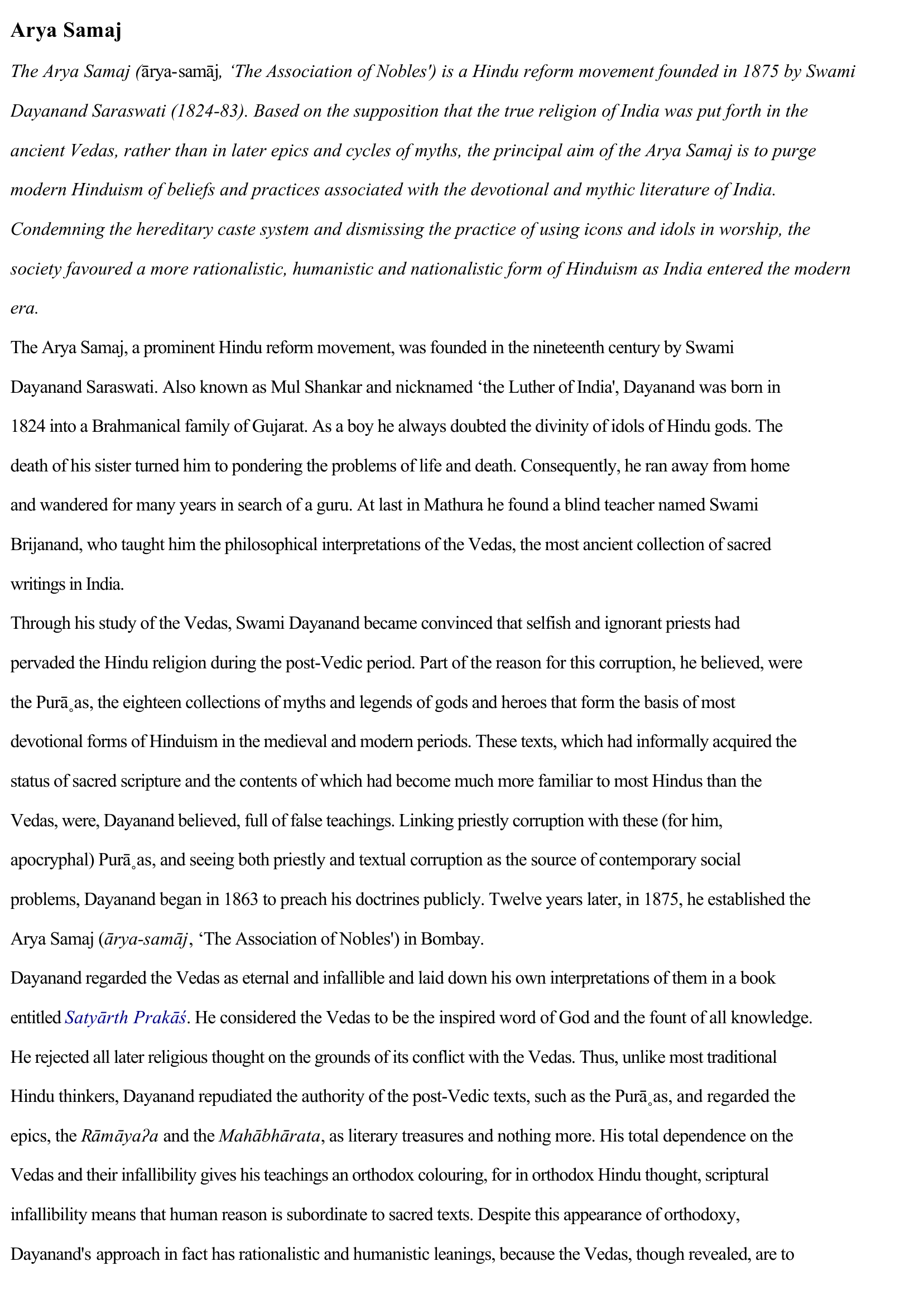Arya Samaj
Publié le 16/05/2020
Extrait du document
«
Arya Samaj
The Arya Samaj ( ārya -sam āj , ‘The Association of Nobles' ) is a Hindu reform movement founded in 1875 by Swami
Dayanand Saraswati (1824-83).
Based on the supposition that the true religion of India was put forth in the
ancient Vedas, rather than in later epics and cycles of myths, the principal aim of the Arya Samaj is to purge
modern Hinduism of beliefs and practices associated with the devotional and mythic literature of India.
Condemning the hereditary caste system and dismissing the practice of using icons and idols in worship, the
society favoured a more rationalistic, humanistic and nationalistic form of Hinduism as India entered the modern
era.
The Arya Samaj, a prominent Hindu reform movement, was founded in the nineteenth century by Swami
Dayanand Saraswati.
Also known as Mul Shankar and nicknamed ‘the Luther of India' , Dayanand was born in
1824 into a Brahmanical family of Gujarat.
As a boy he always doubted the divinity of idols of Hindu gods.
The
death of his sister turned him to pondering the problems of life and death.
Consequently, he ran away from home
and wandered for many years in search of a guru.
At last in Mathura he found a blind teacher named Swami
Brijanand, who taught him the philosophical interpretations of the Vedas, the most ancient collection of sacred
writings in India.
Through his study of the Vedas, Swami Dayanand became convinced that selfish and ignorant priests had
pervaded the Hindu religion during the post-Vedic period.
Part of the reason for this corruption, he believed, were
the Pur ā˳as , the eighteen collections of myths and legends of gods and heroes that form the basis of most
devotional forms of Hinduism in the medieval and modern periods.
These texts, which had informally acquired the
status of sacred scripture and the contents of which had become much more familiar to most Hindus than the
Vedas, were, Dayanand believed, full of false teachings.
Linking priestly corruption with these (for him,
apocryphal) Pur ā˳as , and seeing both priestly and textual corruption as the source of contemporary social
problems, Dayanand began in 1863 to preach his doctrines publicly.
Twelve years later, in 1875, he established the
Arya Samaj ( ārya -sam āj , ‘The Association of Nobles' ) in Bombay.
Dayanand regarded the Vedas as eternal and infallible and laid down his own interpretations of them in a book
entitled Saty ārth Prak āś .
He considered the Vedas to be the inspired word of God and the fount of all knowledge.
He rejected all later religious thought on the grounds of its conflict with the Vedas.
Thus, unlike most traditional
Hindu thinkers, Dayanand repudiated the authority of the post-Vedic texts, such as the Purā˳as , and regarded the
epics, the Rām āya ʔa and the Mah ābh ārata , as literary treasures and nothing more.
His total dependence on the
Vedas and their infallibility gives his teachings an orthodox colouring, for in orthodox Hindu thought, scriptural
infallibility means that human reason is subordinate to sacred texts.
Despite this appearance of orthodoxy,
Dayanand 's approach in fact has rationalistic and humanistic leanings, because the Vedas, though revealed, are to.
»
↓↓↓ APERÇU DU DOCUMENT ↓↓↓
Liens utiles
- RamakrishnaRamakrishna (1834-1886), brahmane bengali, l'un des principaux acteurs du renouveau indien au XIXe siècle avec Vivekananda, son disciple, et Dayananda Saravasti,fondateur du mouvement réformiste hindou Arya Samaj.
- Brahmo Samaj

































